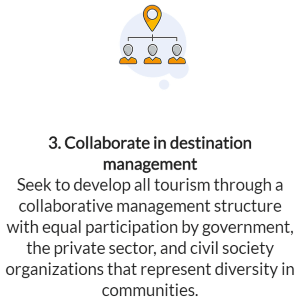Has ‘Future of Tourism’ failed host communities?

The Future of Tourism Coalition is rather like a public relations pyramid scheme. The earlier one signs up to it, the greater the PR benefit. After everyone rushes in it will no longer be newsworthy. So if you’re going to sign up for it, do so after you read this hot take. Or wait until it actually means something.
Leave it to li’l ol’ “GT” to push back a little …
That’s right. Your correspondent is referring to The Future of Tourism Coalition, which are six non-governmental organisations, advised by the Global Sustainable Tourism Council, plus several founding signatories “with the global mission to place destinations at the center of recovery strategies”.
Host communities out-voted

Unfortunately, in the third of 13 “guiding principles”, the Coalition positions a destination’s host community as merely an equal partner with government and industry: “… equal participation by government, the private sector, and [the community]”.
This “guiding principle” implies that local people can be overruled by a two-thirds majority comprised of industry and government. Notwithstanding the vague limits the other unenforceable guiding principles place on their behaviour, this condones unholy alliances between government and industry as they continue to have their way with landscapes, cultures, and communities. To the extent that the tourism industrial complex is a real thing, this guiding principle does nothing to dismantle it.
Uncharitable interpretation? Perhaps. The authors have left it open for interpretation.
Tourism management & tourism development are not the same
To be fair, equal participation in tourism destination management is probably a step forward for many host communities. But your correspondent has argued that local communities should have the veto power over tourism development.
And on that distinction between development and management, the third “guiding principle” is confusing. Is it about management, or development, or both? The header says “destination management”. The body says “develop all tourism”. Which is it?
If development is included, why isn’t the Coalition advocating for host community veto? That would do much to put the power back into the hands of destinations, which are meant to be “at the center” of the Coalition’s mission.
So it’s back to the PR pyramid scheme … Your correspondent suspects that many (not all) of those who sign up to and announce their association with this initiative will be doing so for the sugar hit; that feel-good rush refined and bagged by the PR mills that comprise much of the travel & tourism industry media.
Ultimately, where real business decisions must be made, the vast majority of the signatories will quite rightly prioritise the survival of their own operations over the valid but vaguely-expressed concerns of this latest exercise in tourism industry virtue signalling.
Featured image (top of screen): Are host communities being ground down by the tourism industrial complex? Image by Andrius Petrucenia (CC BY-SA 3.0) via Wikimedia. “GT” cropped it and applied a rouge filter.





